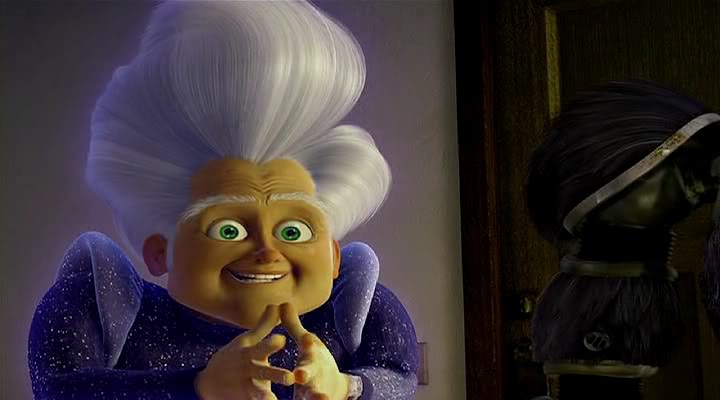Speculative Love, Part 5: Father Issues
Our barn-burner discussion of the non-spec-fic movie, C0urageous, reminded me (thanks, Stephen) that I haven’t talked about another sort of love (or lack thereof) we often find in speculative stories: parental love. More specifically, paternal love.
Fathers are most often a focus of dramatic conflict in speculative fiction, whether in film or on the page. Fathers spur the main character to action in many ways, including the following:
1. Our hero is trying to earn his father’s love or approval: In the Star Trek episode, “Journey to Babel,” we learn that Spock’s father never got over his son’s decision to enter Starfleet rather than attend the Vulcan Science Academy. Spock, meanwhile, is driven by an intense perfectionism as he tries to validate his choice. A crisis brings them back together, revealing a powerful love between these two stubborn, emotionally-repressed people.
2. Our hero is trying to live up to his father’s magnificent legacy: How to Train Your Dragon‘s Hiccup feels the weight of his Viking chieftain father’s accomplishments and struggles to emulate him in his own way, though he’s woefully unequipped for the task.
3. Our hero is trying to overcome his father’s despicable legacy: In Star Wars – Return of the Jedi, Luke Skywalker copes with the shattering revelation that Darth Vader is his father, and forges his own path as a Jedi.
4. Our hero is trying to escape his father’s control and establish himself as an adult: Thor chafes under Odin’s authority and yearns to take the reins of power in Asgard before he is fully mature as a leader and a man.
5. Our hero is trying to restore a broken relationship with his father: Indiana Jones and the Last Crusade shows Dr. Jones the Younger overcoming years of conflict and estrangement, gaining new respect for his father as a professional and rediscovering his love for him.
As usual, I’m sure our brilliant readers can offer more and better examples of the father-son dynamic in spec-fic, and my apologies, ladies…father-daughter, mother-daughter, and mother-son issues are three other topics for three other days. I’ve got my hands full with fathers and sons here, but feel free to chime in with your perspective on this topic.
Where was I? Oh, yes, the fathers…
The fathers, meanwhile, usually blunder along, all unaware of the profound effect they have on their sons, whether through detachment, uncaring, ignorance, incompetence, or personal pride. We see the same sorts of patterns in the Bible. It’s frightening how many delinquent or just plain evil offspring are sired by God-fearing fathers who are otherwise praised and held up as paragons of virtue for our imitation. Adam, Noah, Abraham, Isaac, Jacob, Samuel, David, Hezekiah…that’s just a partial list of patriarchs and kings with less-than-stellar father-son relationships.
Yes, they were flawed human beings. Of course, we can’t blame them for their children’s bad choices. We’d never do that to fathers today, as if their tally of well-behaved children who go on to follow in their righteous footsteps was the ultimate yardstick of their worth as parents, right?
Right?
“There goes Jack. Didya hear? One of his boys isn’t living for the Lord. Cleaned out the family bank account and took off east to the big city.”
“It was just a matter of time. Boy was always a little hellion. Jack should have reined him in tighter.”
“The other one’s doing fine. Near as I could tell, he treated them both fairly, set a good example, took ’em to church…what d’you think happened?”
“Lord only knows. Some guys can’t hold things together for the long haul. Two kids was one too many for him.”
“You think the boy will ever come back home?”
“Jack thinks he will. The poor sap stands out at the crossroads every night, waiting. Pitiful.”
“Yessir, it’s one sad story. There but for the grace of God go you and I.”
“Amen, brother.”
Anyhow, I don’t think anyone will argue that being a father is easy, and there isn’t much explicit direction in the Bible about how to do it. Paul directs Christian fathers to not provoke their children to wrath but to “bring them up in the nurture and admonition of the Lord,” without providing further detail. Most of the guidance we receive is via illustration–as we often say around here, “showing, not telling.” We see Job’s continual prayer for his children. we see the strength of Abraham’s love for Isaac despite an incomprehensible command from God to sacrifice him. We witness the intensity of Jacob’s love for his sons (though he had his favorites and seemed most engaged when they were in peril). We see David’s steadfast love for Absalom in the face of that son’s rebellion. Jesus takes numerous opportunities to illustrate the love he shares with his Father, which often stands in stark contrast to what we may have experienced within our own families.
And perhaps that’s the key. Jesus characterizes God most often as “Father.” To be a good father is to become conformed to the image of God the Father, the Father who provides for us, guides us, and helps us in distress. The Father who loves us, even when we stray, and who welcomes us with open arms when we come to our senses and return to Him.
We can’t make that happen in and of our own power. The patriarchs couldn’t do it, and we’re no less broken than they were. All the guidebooks and checklists and good intentions and promises in the world won’t suffice. What we can do is be obedient to the direction and example God has provided us, asking for His strength, and relying on Him for the results. Will we still make mistakes and have problems? Yes. But we’ll have the best help in the universe along the way.












































One I thought was interesting is Meet the Robinsons (which I admittedly didn’t think I was going to like because I tend to take issue with how most adoption stories are handled). There’s nothing really wrong with the father, but you get to suddenly see this odd perspective of where his principles and character came from.
Meet the Robinsons was one of those cartoons that wound up being better than the sum of its parts. It gives me a warm, cozy feeling whenever the kids watch it.
In Harry Potter, a lot of the subplot revolves around Harry finding out about his parents, but especially his father. And the things he learns greatly effects Harry’s own outlook and development as a character. Sure, James Potter had warts, same as everyone else, but when the chips were down, he was a good guy. And he died for it. (It’s why I keep hoping Rowling will go back and write a prequel with James and Sirius, like that little short story she wrote with them getting pulled over by the cops for speeding.)
Another great showcase for father issues is Lord of the Rings, where we see Faramir, the warrior son of Denethor, trying to escape the shadow of his brother Boromir and gain the love and respect of his father, who’s battling an addiction to Sauron TV. There’s also Eomer, who lives as an outcast guarding the northern marches of Rohan after his father, King Theoden, falls under the sway of self-help guru Grima Wormtongue and disowns him.
(Sorry to nit-pick, but Eomer was Theoden’s nephew, though yeah, the dynamic is father-son.)
Hadn’t thought about LotR in that light. I wonder what it means for Sam, who loved his father in spite of the fact that they didn’t always understand each other. On the other hand, Sam became quite a good father himself.
How about The Incredibles? There’s a superhero story told from the parents’ point-of-view, where being a good husband/father is an important part of the plot. I was struck by the dilemma of “keeping the family safe” vs. “the family working together”. Kind of the leader vs. protector dynamic, and how to balance that.
Andrea: (Sorry to nit-pick, but Eomer was Theoden’s nephew, though yeah, the dynamic is father-son.)
That’s what I get for working from memory. (frantically fact-checks) Ah, but Eomer and Eowyn were adopted by Theoden after their birth parents’ deaths, and Eomer is heir to the throne of Rohan. So, we’re both right. Stepfathers probably deserve their own issue #6 in my list above.
Andrea: How about The Incredibles?
That’s another great example, especially from the perspective of the father, who was confident and capable as a single, but awkward and tentative as a husband and parent.
Then, there’s Syndrome, who lacks a father figure (and is rejected by the one he wants) and goes bad.
So much wonderful imagery in that movie–the father, strong and larger than life, constantly crammed into tiny spaces; the infinitely-flexible mother; the invisible teenager who can create impenetrable barriers; the hyperactive little boy with a surplus of energy; and the baby with unlimited potential, able to become almost anything.
Fred: That summary of the Incredibles is the best explanation of those characters that I’ve ever read. 😀
And now for the obligatory Doctor Who examples.
Classic episodes didn’t connect to families much, and even most of the Tennant era limited family intereactions to the companion’s mum slapping the Doctor. But one exception to that is Donna Noble and her grandfather Wilf Mott. Wilf is supportive of her, even when Donna’s mum is less than encouraging.
(Side note) A post on the BBC America blog suggested that the Doctor/Amy relationship is closer to a parent/child situation then previous companions (Link here http://blogs.bbcamerica.com/anglophenia/2011/08/26/a-companion-to-the-doctors-companions-amy-pond/) and I found it quite convincing. Warning: makes several scenes even sadder.
In the ‘children’s’ spinoff Sarah Jane Adventures, Sarah Jane fufills the mothering role for all her gang, but her relationship with Luke is amazing. He was grown by the Bane as an archeotype of humanity, but at heart, he’s still a boy who loves his mummy. In the season one episode, he is believed to be another missing boy. The police come by to take him back, and even as Sarah Jane tries to convince him that this is a good thing, you can tell that she’s about to fall apart. Seriously, it’s beautiful.
Lost is one long series revolving around daddy issues. Everyone on the show seems to have problems with their dads (except the MIB and Jacob), but the focus is definitely Jack Shephard’s relationship with his dad, Christian Shephard.
It’s been said that Western literature as a whole can be generally summarized as the struggles and conflicts between fathers and sons. Rene Girard’s most famous book on literature argues that all conflict is inherently mimetic desire – the desire to imitate someone you admire, which inevitably leads to conflict, since to become the person you admire you must fight, best and replace them. The narrative of Joss Whedon’s series Angel revolves around Angel’s love for a son who hates and despises him. In fact, Joss Whedon’s Buffy the Vampire Slayer involves an absentee father-figure whose shadow is never truly shaken. Postmodern literary theory (primarily through Harold Bloom) has argued that the act of writing allusions and literary influences into your work is an act of ontological violence – the author must die so that the text might live.
It’s a classic conflict. You’re so right to tease this out, Fred, and to point to Christ as the resolution of the problem. As David Hart has argued, Christ’s relationship with the Father is the solution to father problems and an answer to the postmodern suggestion that symbolic patricide as the means of being free of a father’s shadow. Christ is the very image of God, who does not even speak except to say the words the Father gave Him to say. In the Christian world there is not ontological violence between father and son, but ontological peace. Only as we are in Christ can we bring peace to the struggle between fathers and sons.
[…] wait. Fred Warren already explored that, and not even near to Father’s […]